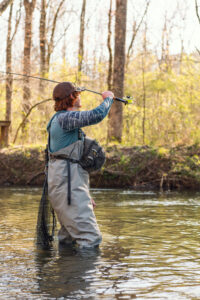Winter Fly Fishing in North Carolina: A Hidden Gem
When most anglers think of fly fishing, their minds often drift to the warm days of spring or the vibrant colors of fall. However, winter fly fishing offers a different kind of magic—one where quiet, peaceful rivers and crisp, cold air create an unforgettable atmosphere. North Carolina, with its abundance of tailwaters and high-elevation streams, provides the perfect backdrop for a winter fly fishing adventure. For those brave enough to embrace the colder months, Wild Water Fly Fishing is ready to lead you through this unique experience.
Why Winter Fly Fishing is Worth the Challenge
Winter fly fishing offers a sense of solitude that is hard to find during the busier months. As temperatures drop, the crowds thin out, and the rivers take on a serene quality. This is a time when nature feels untouched, and the peacefulness of the surroundings adds to the overall experience. For those seeking quiet time on the water, winter fishing in North Carolina delivers in abundance.
 Additionally, while the cold weather might deter some, trout remain active in the winter, especially in tailwaters like the Nantahala River, where water temperatures remain relatively stable due to dam releases. Trout metabolism slows in colder water, but they still need to feed, making them more predictable in their habits. Anglers who learn to adapt their techniques can enjoy productive days on the water.
Additionally, while the cold weather might deter some, trout remain active in the winter, especially in tailwaters like the Nantahala River, where water temperatures remain relatively stable due to dam releases. Trout metabolism slows in colder water, but they still need to feed, making them more predictable in their habits. Anglers who learn to adapt their techniques can enjoy productive days on the water.
Prime Winter Fishing Locations in North Carolina
North Carolina is home to some of the best winter fly fishing spots in the Southeast. The region’s tailwaters, in particular, provide consistent water temperatures, which keep the fish active throughout the winter months. One standout location is the Tuckaseegee River, a favorite for both experienced and beginner anglers. Its delayed-harvest section provides an opportunity to target trout without the pressure seen during other seasons.
The Nantahala River is another prime destination, especially the lower section, where cold water from Lake Nantahala flows through the tailwater. This consistent water temperature creates an ideal habitat for wild rainbow trout, which are known for their fast strikes even in the coldest months.
For those looking to experience something more remote, the East Fork French Broad River offers excellent winter conditions. The smaller stream size allows for intimate fishing experiences, perfect for anglers who want to sharpen their skills in more technical waters. While the fish might be less aggressive than in warmer months, they are still active, and with the right approach, anglers can have an incredibly rewarding day.
Adapting Your Approach for Winter Fly Fishing
Winter fishing requires a shift in technique and mindset. The colder water means that trout are less likely to move far for food, making it essential to get your flies in the right zone. Nymphing becomes the go-to method during these colder months, as trout tend to feed below the surface where insect activity remains steady.
Euro nymphing and tight line nymphing are particularly effective strategies, allowing for precise presentations in slower-moving water. Wild Water Fly Fishing specializes in these techniques, and their experienced guides will teach you how to adjust your approach to match winter conditions.
Streamer fishing can also be productive, particularly when targeting larger, more aggressive brown trout. These fish often seek out bigger prey during the colder months, and casting a well-presented streamer can lead to exciting catches. The key is patience—winter fly fishing is not about the number of fish but the quality of each catch.
Preparing for a Winter Fishing Trip: Gear and Mindset
The key to enjoying winter fly fishing is proper preparation. Dressing appropriately for the weather is essential. Layering is the best approach, as it allows you to stay warm without overheating. High-quality waders and boots are critical for keeping your feet dry and insulated against the cold water.
Polarized sunglasses are another important piece of gear. With the sun lower in the sky, glare off the water can be intense, especially when snow is present. Sunglasses not only protect your eyes but also help you spot fish and improve your casting accuracy.
One of the most important aspects of winter fishing is maintaining a positive attitude. The cold can be challenging, but the rewards of landing a trout on a crisp winter day far outweigh the discomfort. Being mentally prepared to embrace the slower pace and adjust your expectations is key to making the most of your experience. The team at Wild Water Fly Fishing will ensure you’re fully prepared, both mentally and physically, to take on the challenges of winter fly fishing.
The Reward of Winter Fly Fishing
Winter fly fishing might seem daunting, but it offers a level of satisfaction that is hard to find during other seasons. Landing a trout after hours of persistence and skill in chilly waters is a moment that every angler cherishes. The solitude and beauty of winter create a memorable experience that will stay with you long after the season ends.
While the fishing may be slower in winter, the quality of the fish you catch can be impressive. Trout tend to stay in deeper pools, conserving energy, but they remain hungry and willing to bite for those who present their flies correctly. With fewer anglers on the water, you also have the added benefit of less competition, giving you access to prime fishing spots that might be crowded during the rest of the year.
Contact Wild Water Fly Fishing for Your Winter Adventure
There’s something uniquely special about fly fishing during the winter months. The combination of quiet waters, the crisp winter air, and the satisfaction of a successful catch makes it a one-of-a-kind experience. Whether you’re looking to sharpen your skills or simply enjoy the peacefulness of the season, Wild Water Fly Fishing is here to guide you through the journey.
